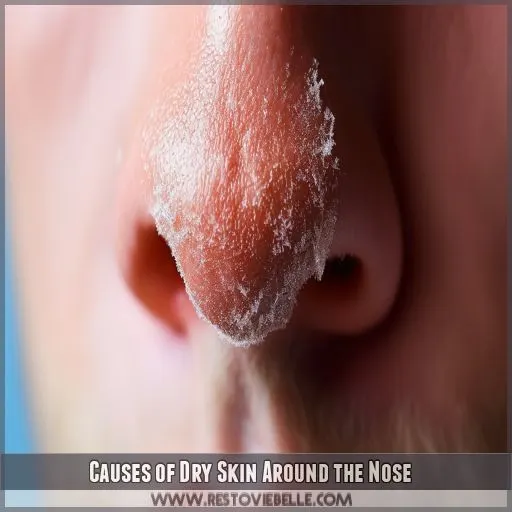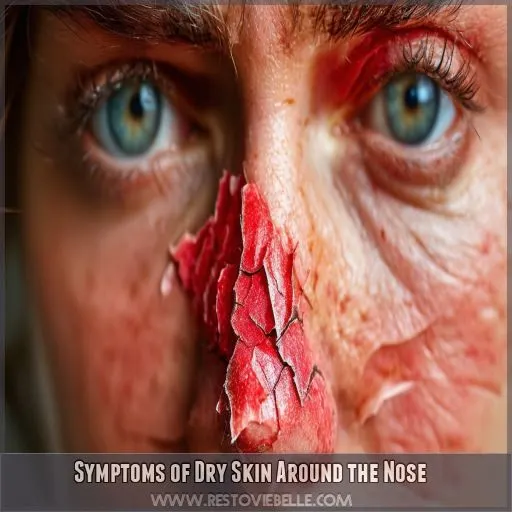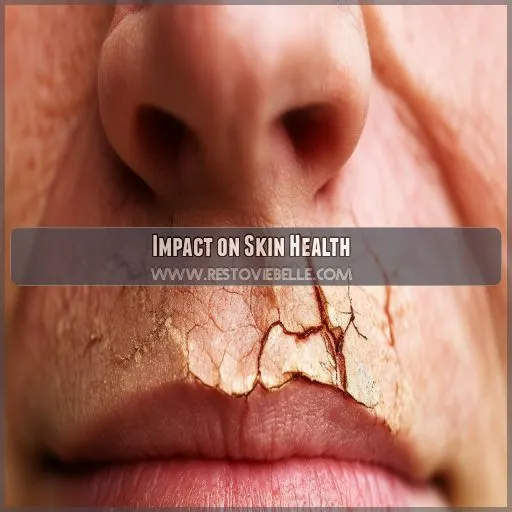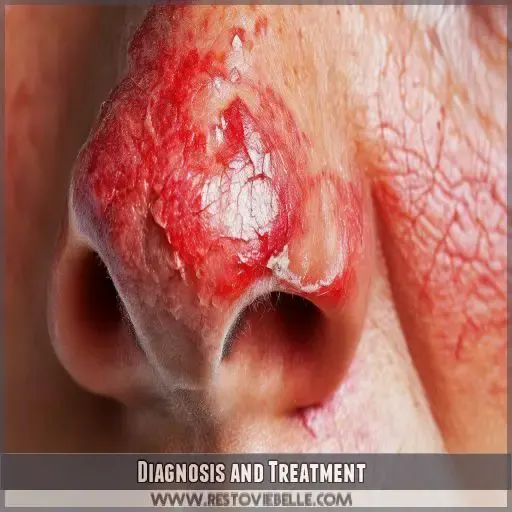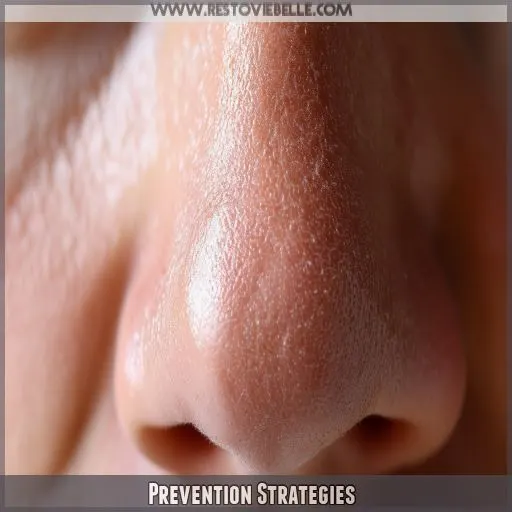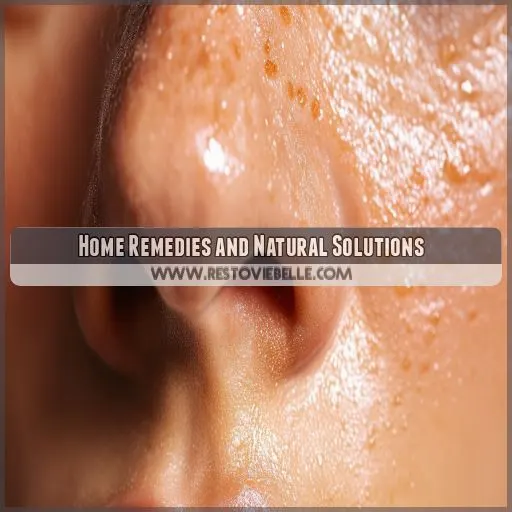This site is supported by our readers. We may earn a commission, at no cost to you, if you purchase through links.
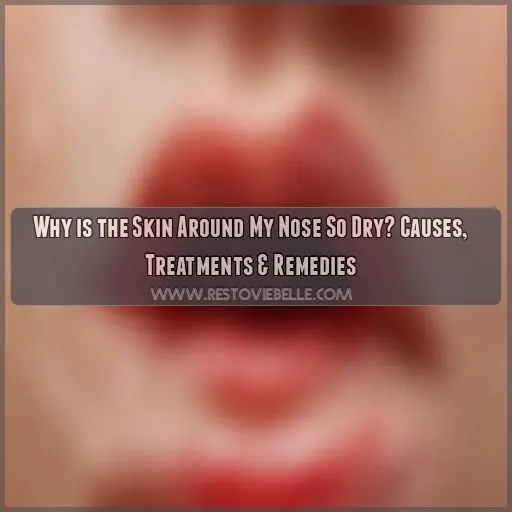
In this article, we shall identify some common causes of the condition, discuss effective treatments, and look into some reliable remedies that can help regain control over it.
Continue reading as we discuss the possible root causes and some practical solutions for this frustrating problem
Table Of Contents
- Key Takeaways
- Why is the Skin Around My Nose So Dry?
- Causes of Dry Skin Around the Nose
- Symptoms of Dry Skin Around the Nose
- Impact on Skin Health
- Diagnosis and Treatment
- Prevention Strategies
- Home Remedies and Natural Solutions
- When to Seek Medical Attention
- Frequently Asked Questions (FAQs)
- How do I get rid of dry skin around my nose?
- Why is the skin around my nose red and flaky?
- Can I put Vaseline in my nose for dryness?
- Why is the skin around my mouth and nose dry?
- Why does my nose dry out?
- Why is my skin dry and dull in certain spots?
- What is dry skin around the nose?
- What causes dry skin on the nose and cheeks?
- Can dry skin around the nose lead to skin infections?
- Is dry skin around the nose a sign of an underlying condition?
- How can I tell if my dry nose is caused by allergies?
- Can using a humidifier help prevent dry skin around the nose?
- What are the long-term effects of chronic dry skin around the nose?
- Conclusion
Key Takeaways
- The skin around your nose can become dry due to environmental factors like dry winter air and low indoor humidity, which damage the skin barrier and accelerate water loss.
- Skin conditions such as eczema and psoriasis can also exacerbate dryness, leading to flaking, redness, and discomfort.
- If your dry skin around the nose doesn’t respond to home care, it may be time to consult a doctor. Indeed, some symptoms indicate more serious underlying problems that should be addressed with professional concern.
- Using a humidifier can help prevent dry skin around your nose. It adds moisture to the air, combating dryness. You might think it’s unnecessary, but it effectively maintains skin hydration, especially in winter
Why is the Skin Around My Nose So Dry?
The skin around your nose can get dry due to factors like cold, dry air, low humidity, windburn, and UV damage. It might also result from skin conditions such as seborrheic dermatitis, eczema, or contact dermatitis.
Symptoms include flaking, peeling, redness, and tightness. Using gentle cleansers and moisturizing regularly can help. Avoiding hot water and opting for ointments might prevent worsening.
These are not signs that should be ignored, as they can all lead to a compromised skin barrier and eventually to infection.
Curious about how to prevent it in an effective way, and treat it? Let’s dive into the specifics!
Causes of Dry Skin Around the Nose
The skin around your nose can become dry due to environmental factors like dry winter air and low indoor humidity, which damage the skin barrier and accelerate water loss. Additionally, skin conditions such as eczema and psoriasis can exacerbate dryness, leading to flaking, redness, and discomfort
Environmental Factors
Environmental factors can exacerbate dry skin around your nose. Cold, dry air and low humidity levels strip moisture, causing flaky skin. Windburn from harsh winds and excessive sun exposure contribute further. Avoiding hot water and ensuring sun protection are key steps to shield your skin.
- Cold, dry air
- Low humidity
- Windburn
- UV damage
- Hot water
Skin Conditions
Skin conditions also cause dry skin around your nose:
- Seborrheic Dermatitis: Leads to flaky, itchy skin, often around the nose and eyebrows.
- Contact Dermatitis: Triggered by allergens in skin care products.
- Rosacea: Red, inflamed skin, sometimes peeling.
- Eczema: Causes dry patches due to a compromised skin barrier.
Addressing these conditions often requires targeted treatments
Symptoms of Dry Skin Around the Nose
When the skin around your nose becomes dry, you may notice symptoms like flaking, peeling, redness, and irritation. This dryness can also cause tightness and discomfort, making your skin feel less elastic and more sensitive
Flaking And Peeling
Flaking and peeling are common symptoms of dry skin around the nose. These issues often result from a compromised skin barrier, dehydration, or environmental exposure. Daily habits like over-cleansing with harsh scrubs or using foaming cleansers can exacerbate the condition. Allergies and harsh weather also play a role, leading to noticeable flakiness and peeling
Redness And Irritation
Redness and irritation often accompany flaking and peeling around your nose. These symptoms can result from allergies, harsh skin care products, or environmental factors, causing discomfort and visible distress. To manage redness and irritation, consider:
- Using fragrance-free, hypoallergenic products
- Avoiding excessive washing
- Applying soothing natural remedies like aloe vera or chamomile
Consult a doctor if symptoms persist
Tightness And Discomfort
When dealing with tightness and discomfort around your nose, you might experience itchiness, swelling, and cracked skin. Dry patches can form, making your skin sensitive. Products like benzoyl peroxide and salicylic acid in your beauty regimen can aggravate dryness. Identifying these symptoms early and adjusting your skincare routine can alleviate this condition efficiently
Impact on Skin Health
Dry skin around your nose can be quite a problem maker for your skin in several aspects:
- Compromised Barrier: With damage to the skin’s barrier, water loss through the skin increases, making it difficult for your skin to be hydrated. This therefore, enhances vulnerability to infection.
- Premature Aging: Dry, flaky skin is going to ring in an early appearance of aging. If you don’t moisturize adequate amounts into your skin, it could mean that fine lines and wrinkles will set in years before they should — possible long-term damage.
- Discomfort and Self-Consciousness: Persistent dryness results in irritated skin, itching, and discomfort. This won’t only affect your physical well-being but also make you sort of self-consciously aware of your appearance—thus affecting confidence.
This will help to counteract the effects, so always use some moisturizing products or sunscreen and maintain a balanced diet.
Diagnosis and Treatment
The following is necessary, but let’s get to feeling the impact of dry skin around your nose. Now, diagnosis and treatment are in place. Getting an idea of how bad your dry skin is can be very helpful in identifying the best approach.
First, consider those underlying triggers: weather and harsh skincare products. This ranges from treatment options of hydration to very gentle care, and, in severe cases, even medical interventions may be necessary.
Markdown unordered lists:
Use moisturizers containing glycerin or hyaluronic acid.
- Ensure mild, fragrance-free cleansers are used.
Exfoliate sparingly to remove dead skin cells.
- Opt for ointments to lock in moisture.
- Monitor for signs of improvement, adjusting as needed.
The slightest change of lifestyle, especially during winter, goes a long way in enjoying good, health of skin. Proper diagnosis shall improve healing, thus lessening discomfort effectively.
Prevention Strategies
Prevention of dry skin formation around the nose, or any other sort of skin, is a question of constant care and knowing what to do. First, clean your skin with gentle, fragrance-free cleansers that won’t irritate the skin. Next comes moisturizing techniques, in which a hydrating moisturizer should be applied immediately after washing the face to lock the moisture in.
Apply sunscreen with an SPF of at least 30 to the skin to avoid sun exposure. The humidity indoors can be kept, particularly in dry months, by using a humidifier that aids in keeping your skin well-moisturized. Keep away from steaming hot showers, which might further drain the natural oils from your body. Drink plenty of water to let your skin rehydrate from within.
- Use a gentle cleanser
- Moisturize regularly
- Indoor humidity maintenance
Implementing these strategies can help keep the skin around your nose healthy and hydrated
Home Remedies and Natural Solutions
From prevention to remedies, natural solutions for dry skin around your nose vary widely. Simple applications of oil with either extra virgin coconut oil or olive oil can provide deep hydration and soothe your skin. Consider these options:
- Shea Butter Benefits: Rich in vitamins A and E, shea butter is excellent for moisturizing and healing.
- Coconut oil remedies: Antibacterial, intensely hydrating; the skin’s moisture barrier can retain itself.
- Jojoba Oil Properties: Because it’s very similar in composition to your skin’s natural oils, jojoba oil works amazingly as a product to maintain balanced hydration.
- Natural Moisturizers: Keep well-hydrated, and include in your diet plenty of omega-3-rich foods such as salmon and flaxseed.
Implementing these natural remedies can significantly alleviate dryness and restore your skin’s natural moisture balance
When to Seek Medical Attention
If your dry skin around the nose doesn’t respond to home care, it may be time to consult a doctor. Indeed, some symptoms indicate more serious underlying problems that should be orientated with professional concern. Look for these signs:
Severe redness, swelling, or pain: This could be due to possible infection or other severe lesions.
- Unusual skin changes or growths: These could indicate skin cancer or other serious diseases.
- Persistent dryness of the skin: Despite regular application of over-the-counter treatments.
- Worsening symptoms: Your condition worsens over time.
In case of the development of any of the symptoms mentioned above, one can appear before the doctor for prescribed medications, insurance-covered treatments, or even to be referred to proper specialist care. Timely medical intervention ensures better outcomes.
Frequently Asked Questions (FAQs)
How do I get rid of dry skin around my nose?
To get rid of dry skin around your nose, use a gentle cleanser, apply moisturizers with hyaluronic acid or glycerin twice daily, exfoliate gently, and protect your skin from harsh weather conditions. If it persists, consult a dermatologist
Why is the skin around my nose red and flaky?
Ah, the nose – the gateway to your facial canvas! The redness and flakiness you’re experiencing could be a sign of seborrheic dermatitis, a common skin condition that thrives in the oil-rich regions around your nose. Fear not, with the right approach, you can restore your complexion’s radiance
Can I put Vaseline in my nose for dryness?
Yes, you can put Vaseline in your nose for dryness. It helps moisturize and protect the nasal passages. However, use it sparingly and consult a doctor if dryness persists or worsens
Why is the skin around my mouth and nose dry?
Imagine your skin like a sponge in winter, it’s susceptible to drying out due to cold air, hot water, and dehydration. You may also have skin conditions like eczema or psoriasis, causing dryness around your mouth and nose
Why does my nose dry out?
Your nose often dries out due to environmental factors like cold, dry air, frequent washing, and skin conditions. Fortunately, gentle moisturizing and protecting your nose can restore its healthy, supple appearance
Why is my skin dry and dull in certain spots?
Your skin’s dry and dull due to factors like harsh weather, hot showers, dehydration, or skin conditions such as eczema. To combat this, use gentle skincare, stay hydrated, and protect your skin with moisturizers and sunscreen
What is dry skin around the nose?
Dry skin around your nose often results from factors like harsh weather, dehydration, or specific skin conditions such as dermatitis. Using gentle cleansers, moisturizing often, and applying sunscreen can help alleviate the dryness
What causes dry skin on the nose and cheeks?
Coincidentally, your dry nose and cheeks might stem from cold weather, dehydrating skincare products, hot showers, or natural skin conditions like dermatitis. Stay hydrated, use gentle cleansers, and moisturize regularly to combat dryness
Can dry skin around the nose lead to skin infections?
Yes, dry skin next to your nose might leave you open to infections if it goes untreated. Cracked skin will significantly facilitate the entry of bacteria into your skin and cause infections. Proper moisturizing and skincare routines are essential to prevent this.
Is dry skin around the nose a sign of an underlying condition?
Like dry leaves cracking underfoot, dry skin around your nose might hint at underlying conditions, such as eczema or psoriasis. Assess your symptoms, hydration, and skincare habits, and consider consulting a dermatologist for personalized advice
How can I tell if my dry nose is caused by allergies?
If your dry nose is due to allergies, you may notice other symptoms like itching, sneezing, or a runny nose. Allergy-induced dryness often occurs when exposed to allergens like pollen, dust, or pet dander
Can using a humidifier help prevent dry skin around the nose?
Yes, using a humidifier can help prevent dry skin around your nose. It adds moisture to the air, combating dryness. You might think it’s unnecessary, but it effectively maintains skin hydration, especially in winter
What are the long-term effects of chronic dry skin around the nose?
Chronic dry skin around your nose can lead to inflammation, redness, cracking, and increased sensitivity. Over time, it can compromise your skin barrier, making it more susceptible to infections and other dermatological conditions
Conclusion
Knowing why the skin around your nose is so dry will need an analysis of environmental factors and some hidden skin conditions.
By recognizing these signs—flaking, redness, discomfort—you shall be better placed to understand how this condition affects your skin health.
Ensure correct diagnosis and effective treatments. Prevention strategies and home remedies give practical solutions, but seek help from doctors when needed.
With this information, you’ll be better positioned to handle and improve the condition


